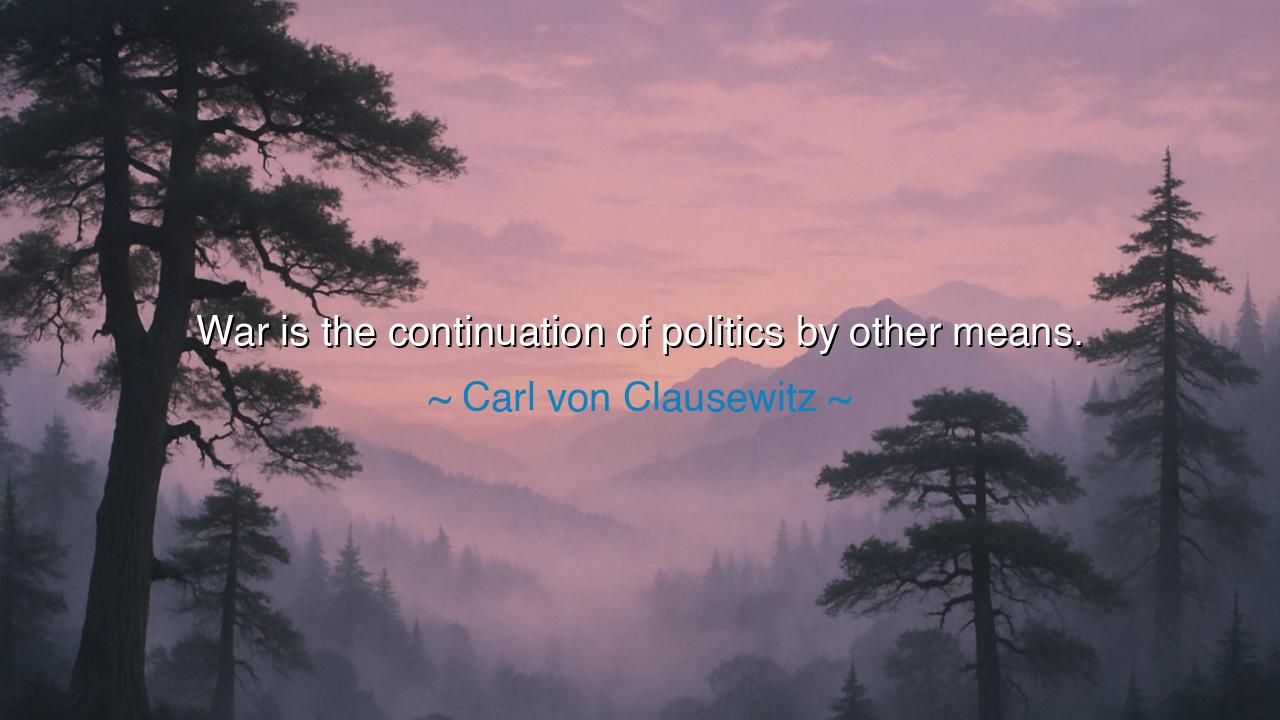
War is the continuation of politics by other means.






The Prussian general and philosopher Carl von Clausewitz, who lived in the furnace of the Napoleonic wars, declared with solemnity: “War is the continuation of politics by other means.” In this phrase, he pierced through the fog of banners and trumpets to reveal the cold essence of conflict. For war is not a separate realm of chaos, but an instrument wielded when persuasion and negotiation fail. It is politics stripped of words, clothed in fire and blood.
The origin of this saying lies in Clausewitz’s great work On War, written in the early nineteenth century. He had served in campaigns across Europe, witnessing firsthand both the brilliance of Napoleon and the devastation his wars unleashed. From his experiences, he sought to understand war not as an accident of passion, but as part of a larger system. To him, nations did not wage war for its own sake. They waged it because their political goals—territory, security, dominance, or survival—could no longer be achieved at the table. Thus war was politics carried into another realm, where the argument was settled not by speech but by the sword.
History itself testifies to his wisdom. Consider the American Civil War. For decades, the United States debated slavery, compromise after compromise failing to resolve the question. Politics could no longer bridge the divide, and so war came. Yet the war was not meaningless violence: it was the continuation of the political struggle over the nation’s soul, now fought with armies instead of arguments. When Lincoln spoke of a “new birth of freedom,” he gave voice to the political purpose that drove the war’s bloodshed.
Or think of the Second World War. The politics of appeasement, the conferences, the treaties—they failed to restrain Hitler’s ambition. When diplomacy reached its breaking point, the contest of wills moved onto the battlefield. But even in the midst of destruction, the aims remained political: to preserve sovereignty, to destroy tyranny, to shape the postwar world. War was not separate from politics; it was politics by other means, Clausewitz’s principle made flesh in the greatest struggle of modern times.
The deeper meaning of his words is both sobering and dangerous. For if war is only the continuation of politics, it strips away illusions of nobility and exposes conflict as an instrument of power. It warns us that leaders may cloak their ambitions in lofty words—justice, honor, liberty—but behind them lies calculation. War is chosen because politics demands it, not because it descends like fate. To understand this is to strip war of false romance and to see it as an act of deliberate will.
Yet there is also a call to responsibility. If war is born from politics, then it is not inevitable—it can be prevented by wiser politics, by negotiation, by foresight. Clausewitz’s insight does not glorify war; it makes leaders accountable for it. When blood is spilled, it is not the work of blind destiny, but of decisions made by men who chose to continue their struggles by other means. The people, therefore, must hold their rulers to account, lest politics once again be allowed to march into war.
Therefore, let this wisdom be carried forward: see war not as a separate monster, but as the shadow of failed politics. Understand that it arises when pride, greed, or fear harden hearts against compromise. And in your own life, learn from this truth: when persuasion fails, do not let your struggles escalate into destruction. Seek always to resolve conflict before it reaches its breaking point. For though war may indeed be the continuation of politics, true greatness lies not in waging it, but in mastering the art of peace.






ADAnh Duong
Clausewitz’s idea that war is just a continuation of politics makes sense from a strategic standpoint, but it raises a moral question. If war is simply another means of achieving political ends, does this make it any less tragic or destructive? Can we ever move beyond this cycle of war and politics, or are they intrinsically linked? And does the modern world still see war as a legitimate political tool, or have we evolved to find other ways?
YTYen Ta
This quote offers a cold, pragmatic view of war—essentially that it’s an extension of the political chessboard. I’m left wondering if this perspective oversimplifies the complexity of war. Are there situations where war transcends politics, where the motivations are more about ideology, survival, or revenge rather than political goals? Or does Clausewitz's view still hold true, even in modern conflicts that seem to have less political clarity?
HHHam Han
Clausewitz’s statement is thought-provoking because it implies that war is an inevitable outcome of political struggles. But can we truly see war only as a ‘tool’ for politicians, or does this take away from the deep human tragedy that comes with it? When politics fail, is war really the only option left, or could more creative solutions, like diplomacy or peace-building, be a better path forward?
LANguyen Lan Anh
Clausewitz’s quote challenges the often simplistic view of war as an isolated event. By saying war is a continuation of politics, he suggests that it’s just another tool for achieving political goals when diplomacy fails. But can we really justify war solely as an extension of politics? Does this diminish the devastating human cost, or does it simply recognize the unfortunate realities of how power dynamics work at the highest levels?